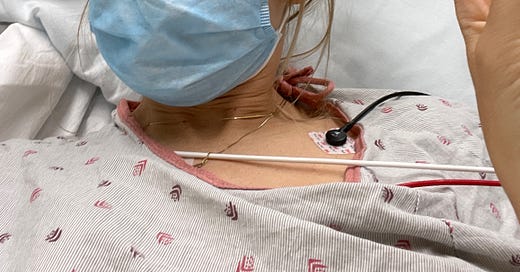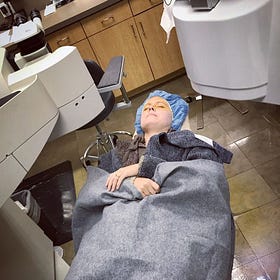A surprising link between surgery + depression + cognitive decline
Something to consider, especially with elective surgery
Hi readers,
Sometimes I learn things, and I really want to share it with you all.
This week while listening to the Bedside Matters podcast I learned, aside from Profi nasal spray being VERY effective (ordered that right away), that a new large study showed a link between surgery and cognitive decline.
First to say, on average surgery is safe and the decision to have a procedure is between us and our doctor - but often there are options beforehand. So, when we are considering next steps, let’s explore our options.
The fact that surgery impacts our mood is not new. Post-op depression is actually quite well-known.
There’s various reasons for this situationally - having surgery causes pain, discomfort physically, financially, and practically. Plus our bodies are processing inflammation - it’s doing major work trying to heal. Some surgeries have a higher depression risk - like bariatric, cardiac, brain, cancer, and major orthopedic procedures.
It’s important for anyone undergoing major surgery to be proactive about mental healthcare after the procedure.
Now for some new data: “Multiple surgeries could lead to cognitive decline, a University of Sydney study has found, using data from the United Kingdom's Biobank to analyse half a million patients aged 40 to 69 and followed over 20 years of brain scans, cognitive tests and medical records.”
So, the more surgeries we have (especially major ones), the more cumulative decline.
Turns out the best post-op gift might be subscription to the New York Times for the Crossword Puzzles and a Sudoku book.
They used MRI’s to look at the brain to see what’s under the hood - finding people with surgeries had developed a smaller hippocampus (your brain’s memory and learning control center).
BUT DO NOT PANIC. The impact is small, although it sheds light on how we need to make sure we not only heal what our bodies experienced in the procedure, but also put energy toward our mental and cognitive health post-op.
The study leads us to ask more questions, but in the end, if we’re feeling blue or brain foggy after going through a major medical experience, it’s totally normal and we’re not alone. Tell your doctor about how you’re feeling or even better, talk to your doctor before the procedure about it.
Especially if we’re feeling these symptoms generally already (like if we’re already feeling a bit blue, surgery might make us feel worse). There are things our medical team can do preemptively to support us.
And maybe also start playing Wordle.
Did you miss it?
How to Reduce Medical Procedure Anxiety
It happens to the best of us. Nothing makes us anxious quite like the time leading up to a medical procedure. I’m not even sure which is scarier - going under anesthesia or staying awake - which is an added layer of deeply distressing.
I started writing this when I was on dialysis. It’s intended to be both memoir and a practical tool to help folks who might be going through something similar or those caregivers and family supporting someone with a challenging diagnosis. NOTE: This is not intended to replace actual medical guidance. Please consult your doctors on your individual challenges and situations. Please talk to your clinicians before adjusting any of your care protocols. Also names have been changed for most of my medical staff.
Thank you to CC Couchois, Roy Lenn, and Dr. Richard Burwick for your founding level donation.





